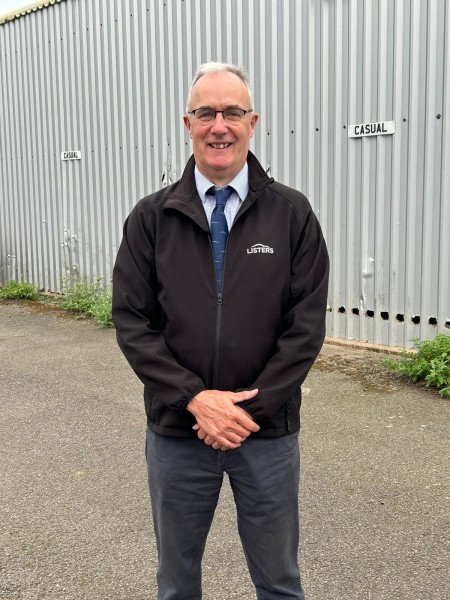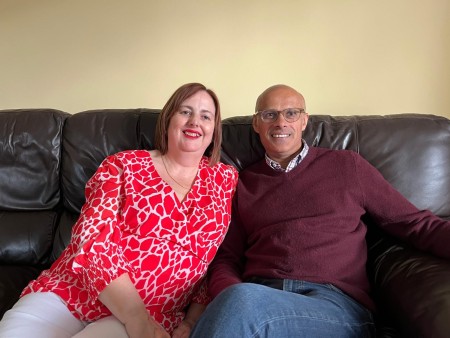A usually fit and healthy Lincoln man who went into cardiac arrest while being shown around his new company car, has been reunited with the emergency team who saved his life.
On the morning of Thursday 9 May 2024, 59-year-old Bupendra ‘Boo’ Parmar was sitting in the driving seat of a car that was parked on his drive at home while Nick Tooby, a sales representative, was showing and demonstrating the features of the car.
Boo recalls: “My last memory was seeing the car coming around the corner of my street and the next thing I’m waking up in hospital the following day!”
Someone who does remember everything very vividly is Nick Tooby.
He said: “I turned away from Boo for a second to explain a feature which came with the car and when I turned back to him, I found him totally unresponsive.
“After failing to rouse him, I ran to the house to tell his wife Suzanne that Boo was having some sort of medical episode.

Thinking back to that day, Suzanne, who has been married to Boo for 22 years, explains what was going through her mind when Nick broke the news to her.
She said: “When I got to the car, Boo was lifeless but making some gasping noises, I then realised I couldn’t feel a pulse.”
With the worst being confirmed, Nick called 999 and was advised to perform CPR.
Suzanne added: “After explaining we couldn’t get Boo out of the car easily, the Emergency Medical Advisor told us to lay him as flat as possible so we could attempt to deliver effective CPR”.
“They were so good at keeping us calm and counting with us during each compression to ensure we were doing it correctly. I really could not have done this without their calm instructions and support. They were amazing and I cannot thank them enough”.
“As I have fibromyalgia in my hands, I was struggling to continue with the CPR, so Nick jumped into action to take over.
Nick, who like Suzanne, had never had to do CPR before that day, said: “It was really challenging and very tiring doing it at the speed you need to do it effectively and it felt like I was doing it for an eternity.
“However, the Emergency Medical Advisor was very encouraging and kept telling me to just keep going at pumping Boo’s chest until the ambulance crew arrived to take over.
“I didn’t think Boo was going to survive but wanted to know I’d done everything possible to give him a fighting chance.”
The fast and effective CPR delivered by Suzanne and Nick did indeed help stack the odds in Boo’s favour.
Ambulance Technician, Chris Pettitt was a member of the crew who responded to this incident.
He said: “My colleague Clair Compton, Paramedic, was first on scene and had managed to get Boo out of the car and got the defibrillator pads on Boo as I arrived.
“Another colleague went to take over delivering CPR on Boo’s chest from Nick.
“Upon placement of the defibrillator, it showed Boo’s heart in a shockable rhythm. With the delivery of one shock, Boo’s heart was beating again.

“Unfortunately, Boo then went back into cardiac arrest while I went into the home to get a pillow for his head. However, Clair delivered another shock from the defibrillator to get Boo’s heart beating once more.”
With Boo’s condition heading in the right direction, and with more crews on scene, the priority was getting Boo into an ambulance and blue-lighted to Lincoln County Hospital. Suzanne followed in one of the paramedic cars.
Suzanne added: “I was sat in the family room not knowing whether Boo was still with us when Clair came over to say she needed to speak with me privately.
“In that moment, I expected the worst news and remembered thinking I was too young to be a widow”.
“To my surprise, Clair was able to tell me that Boo was sitting up and talking. We were both very emotional”.
“Our two sons were making their way up to us from London to support us, so it was great to give them such a positive update while they were en-route to Lincoln.”
After spending just three days in hospital, Boo was discharged on Sunday 12 May.
Boo, who is Project Manager for a big firm, had a healthy and active lifestyle before his cardiac arrest in May. He is a member of a local running club and would usually run and work out in his spare time.
Boo said: “I ran the London Marathon in 2023 and was going to run the Manchester Marathon this year but couldn’t due to a recent operation on my knee. I am now planning on running the Manchester Marathon in April next year and will be raising funds for the British Heart Foundation”.
“I don’t smoke, I drink in moderation, exercise regularly and I’m not overweight.
“I appreciate a healthy lifestyle to try and stack the odds in my favour. That’s because my dad died of a heart attack at the age of 61, and my mum who is in her eighties, recently had a heart attack.
“I appreciate that a cardiac arrest is very different to a heart attack, as they don’t discriminate or care how healthy or active you are. As I have learned, they can happen to anyone at any time.”
Top tips
A medical emergency involving the heart, such as a cardiac arrest or a heart attack can happen to anyone at any time.
A cardiac arrest (what happened to Boo Parmar) is when your heart suddenly stops pumping blood around your body. Although it is sometimes mistaken for a heart attack, if someone is in cardiac arrest they collapse suddenly and will be unconscious, unresponsive, and not breathing or breathing normally – this may mean they’re making gasping noises.
A heart attack happens when there’s a sudden loss of blood flow to a part of the heart muscle. This causes symptoms such as pain or a feeling of pressure or a burning in the chest. Someone having a heart attack is usually conscious.
Both a cardiac arrest and a heart attack are medical emergencies, and you should call 999 straight away.
While we don’t want to scare people, it is important to consider the following tips to help increase yours and others’ chances of survival should the worst happen:
Cardiac arrest
- Learn how to do CPR – receiving CPR within the first three to four minutes of a cardiac arrest is crucial in terms of maximising the chances of survival and reducing the risk of the person living with a brain injury if they do survive. The British Heart Foundation also has really helpful resources on CPR and defibrillators.
- When calling 999 for someone who is in cardiac arrest, in addition to being advised to perform CPR, if there is someone else with you they may be advised to go and fetch a public access defibrillator if we identify an available one nearby. They are often in places like train stations, schools, and shopping centres. Anyone can use one and you don’t need training to do so.
Heart attack
- If you’re experiencing chest pains, try not to exert yourself physically unnecessarily, such as going upstairs to bed if you’re already downstairs – instead lay yourself down on the sofa. Most chest pain is not a sign of anything serious but you should get medical advice just in case. If the pain gets worse (makes your chest feel tight or heavy) or rapidly starts progressing to other parts of the body eg arms, back, neck or jaw – this could be a heart attack. If this happens, call 999 and remain downstairs so the responding ambulance crew will have easy access to you.
- If you have had a heart attack, it's important that you rest while you wait for an ambulance, to avoid unnecessary strain on your heart. When you call 999, the Emergency Medical Advisor may advise you to take aspirin for this chest pain. Aspirin helps to thin your blood and improve blood flow to your heart.